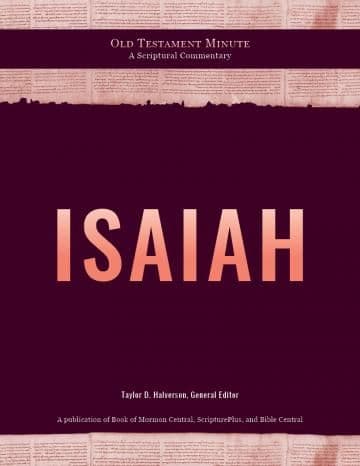Book
34 Chapters

Isaiah 13 and 14 are prophecies concerning Babylon (compare 2 Nephi 23) that will not happen for more than two hundred years.
13:1. Babylon was becoming a cultural and economic power in Isaiah’s day but was not yet the conquering nation it would later become. The Babylonians destroyed Jerusalem and the temple in circa 587 BC and carried the captive Jews away to Babylon.
13:4–5: “Jehovah Almighty, the Lord Almighty, is mustering an army for war. They come from faraway lands, from the ends of the heavens.” These two verses describe a heavenly army that the Lord is gathering to battle against nations who have rebelled against Him.
13:7–8. Because of this, all hands will go limp, every man’s heart will melt. Terror will seize them, pain and anguish will grip them; they will writhe like a woman in labor.
Isaiah often uses the image of a woman in one of the stages of childbirth.[1]
13:11. The Hebrew word for “world” is tevel rather than ‘eretz (which means “land” or “earth”), possibly indicating that Isaiah’s prophecy is not directed at just Babylon but applies to the whole world. See also Isaiah 14:26.
13:12. This could be rendered as, “I will make a [true] man, scarcer than pure gold, more rare than the gold of Ophir.” Ophir was a Phoenician port city famed for its great wealth. Its precious gold was in high demand and thus hard to obtain.
13:14. This can also be translated, “Like hunted antelope, like sheep without a shepherd, each will return to his own people, and each will return to his own land.” See also Isaiah 14:1. Has this happened in our own time, or is it speaking of some future when the many refugees we have seen will return to their native lands?
13:17. The Medes were located northeast of Babylon. They had a fierce reputation in Isaiah’s day and later helped the Persians overthrow Babylon in 539 BC.
13:19. In Isaiah’s day, ancient Babylon was a symbol of earthly glory and power: “the jewel of kingdoms, the glory of the Babylonians’ pride, will be overthrown by God like Sodom and Gomorrah. She will never be inhabited.” Babylon did not overthrow Assyria until circa 607 BC.
13:20. The prophecies in verses 20–22, describing the desolation of Babylon, were not fulfilled in Isaiah’s day, nor when Babylon was taken by the Persians and Medes in 539 BC, but have since been completely fulfilled. The most glorious of ancient cities was completely abandoned and today is only an archaeological site of dust and rocks.
13:21. This describes places that have been completely abandoned.
There should not be a chapter break between chapters 13 and 14.
[1] See Isaiah 35:3–4. For other childbirth or childrearing images in Isaiah’s writings, see Isaiah 13:8; 21:3; 23:4; 26:17; 28:9; 33:11; 37:3; 42:14; 45:10; 49:15, 21–23; 54:1; 60:4, 16; 65:23; 66:7–14.
Book
34 Chapters
Items in the BMC Archive are made publicly available for non-commercial, private use. Inclusion within the BMC Archive does not imply endorsement. Items do not represent the official views of The Church of Jesus Christ of Latter-day Saints or of Book of Mormon Central.